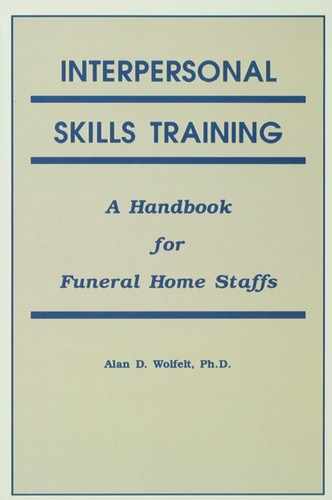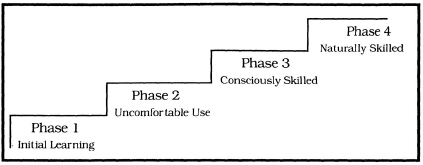DEVELOPING ESSENTIAL HELPING SKILLS FOR SUCCESSFUL FUNERAL SERVICE PRACTICE
“Nature gave us one tongue and two ears so we could hear twice as much as we speak.”
Epictetus
IS THIS AN “ART” OR A “SCIENCE”?
In many ways learning specific helping skills is like learning to paint on canvas. Even when certain skills or techniques are learned, the task is not accomplished. Why is that? Because once you as a funeral director learn a particular skill you must learn what it means to transcend the technique and develop the “art of helping.”
So, another bias of this author is that helping our fellow human beings during times of crisis is every bit as much an “art” as a “science.” Interpersonal skills are more than a collection of techniques. Helping others is a demanding interpersonal experience that requires energy, focus, and a desire to understand, not only other people, but oneself.
In essence, understanding is the key to helping people create meaningful funeral rituals. The capacity to communicate understanding and accurate empathy for bereaved people’s experience is absolutely essential to becoming “artfully helpful.”
Through effective interpersonal being and learning good communication skills you can gently enter into another person’s world. Ultimately, the more effectively you communicate,the more helpful the relationship becomes in leaving the family feeling supported during this difficult time.
THE IMPORTANCE OF KNOWING YOURSELF
An old, but true statement reads as follows, “If you are going to help someone else, the place to start is with yourself.” It seems that the more we know and understand about ourselves (our values, expectations, feelings, and reactions) the more we can understand and appreciate others.
Learning about your own perceptions of the world helps you come to understand others and their unique perceptions. As you explore yourself as a total person you hopefully allow and encourage yourself to grow and change. As you become comfortable with “who you are” others become comfortable being in your presence. In other words, self-acceptance and being at ease with yourself, helps others feel comfortable in your presence.
This self-growth attitude of continually striving to know who you are helps the families you serve come to trust you. The family will come to know who you really are as a person for you will have developed no need to hide behind a mask of being “Mr. or Mrs. Funeral Director.” Obviously, what we are exploring here is being authentically who you are as a person.
To be authentic means to know and be yourself. Some people enter funeral service and discover early in the process that they “do not belong.” In my experience this is often, not always, because they cannot be authentically who they are. Maybe they thought funeral directors all made tons of money and drove fancy cars. If this is what they valued and they couldn’t achieve it quickly, they ended up leaving in search of these values elsewhere.
What I’m suggesting is that as we strive to know ourselves, understand ourselves, and accept ourselves, others will sense not only someone who possesses skills, but someone who also has a compassionate presence. If you do not discover this compassionate presence within yourself, you may well want to consider a different profession.
In summary, as you strive to know yourself, you become capable of “being present” with people in pain. You become capable of focusing outside of yourself on the needs of the bereaved family. You also become free to listen, to try to understand as much as possible, to attempt to understand what the family has been through and what they are going through right now.
So, knowing yourself also means not getting in the way of the people who come to you at a true time of need for support, understanding, and guidance. While you will never completely achieve total self-knowledge that results in being more “available” to others, only through making the effort can you approach it.
Funeral director-family communication can be seen as an exchange between two or more people. And, actually, three very different, yet interdependent levels of communication exist.
The three levels we will identify and describe are
1. the exchange of information,
2. the exchange of emotion, and
3. the exchange of meaning.
The exchange of information involves the interaction of the funeral director obtaining essential factual information from the family, i.e., social security number, veterans information, etc. While this process may seem simple this exchange is complicated by the reality that humans do not give and receive information passively. The emotional state of each participant in the interaction, as well as how each person feels about each other affects the nature of the interaction. So, it’s never as simple as just asking questions and getting answers.
Also an exchange of emotion occurs among participants. You are working with people in acute grief who will be very sensitive to your capacity to empathize and “be with” them. If the family senses interpersonal distance or a funeral director who just wants information so he or she can “get the job done,” they will consciously or unconsciously pull away from the interaction. So, a constant awareness of people’s “feelings” must be an integral part of the funeral director’s helping role.
Finally, an exchange of meaning occurs. The family comes to you to create a funeral that will bring them meaning and purpose. As you communicate with them they “teach you” how you can help them create a meaningful funeral service. This means going beyond surface communication to seeking an understanding of how you can aid them in the “search for meaning.” If they go away from the funeral without a sense of meaning or value, odds are they won’t come back to you for service in the future.
The successful funeral director-family encounter consists of all three of these levels of communication. Awareness of these levels will allow you to stay conscious of how they impact your interactions with families served.
INTRODUCTION TO HELPING SKILLS TRAINING
To enhance your overall effectiveness as a helping funeral director, you must make use of communication skills involving perceiving nonverbal messages, hearing verbal messages, and responding verbally and nonverbally to these messages. To be certain that the skills outlined in this book become an integrated part of your tools as a helper, you must practice them frequently.
As you begin to learn these skills, you will probably find yourself concentrating more than ever before on your communication behaviors. This is certainly natural and may result in some initial feelings of discomfort and tension. With time, however, you will find yourself relaxing and discovering that the learning process is very rewarding. You will probably find yourself proceeding through four distinct phases in learning the helping skills taught in this section of the book. (See Figure 5.1.)
Figure 5.1. Progression of skill acquisition.
Understanding the following four phases of learning can make this training much more enjoyable. You can relax and not berate yourself when you don’t immediately use the skill to the best of your ultimate capability. In other words, learning takes place over time and with focused practice.
PHASES OF ACQUIRING NEW INTERPERSONAL SKILLS
This phase involves learning that some skills are available to you that you may not have known about. This may result in a combination of excitement about learning something new and some fear about the acquisition process. But again, remember, with appropriate training and practice you can acquire the ability to communicate even more effectively!
In this phase you have increased your awareness of some new ways of communicating but probably experience some difficulty in using the new skills. You may feel mechanical and like this really isn’t you speaking or listening. You don’t feel spontaneous because you have to think very carefully as you attempt to use any new skill.
In this phase you begin to use the skills more effectively; however, you continue to be self-conscious as you use them. You are getting better at using the skills, but they still feel somewhat mechanical. You begin to use language that is natural to who you are.
This final phase occurs only after you have completed the training and practiced the skills extensively. You must use the skills on a daily basis over an extended time to get to this level of skill. When you achieve this level, the skills come naturally and comfortably without you even consciously thinking about them.
Remember as you progress through these four phases of learning you will regress from time to time. But, don’t give up! This regression is a normal part of any new learning experience. Keep envisioning yourself eventually interacting with people consistently at level four—and you will get there. Just keep in mind—PRACTICE, PRACTICE, AND PRACTICE.
In Chapters 6 through 14, specific helping skills are outlined so that you will learn specific human relations/communications skills in a sequential fashion. They focus on your ability as a funeral director to better understand yourself and others. These skills will be helpful from the initial point of contact with bereaved families, during the arrangement conference, as well as in the extended period of follow-up. An added bonus is that these skills will aid you in all of your interpersonal relationships with family, friends, and co-workers.
Once you have learned to make use of these skills, you will find the results rewarding. The people you have contacted will feel better understood and confirm this feeling in their interactions with you. After all, you can expect people to respond positively when they feel a sense of understanding from you. Good luck as you work toward becoming an even more effective helping funeral director.
FORMAT FOR LEARNING HELPING SKILLS
Primarily for the purpose of learning in a workshop format, each skill to be learned has been described in a comprehensive eight-step procedure as follows:
1. define the skill,
2. identify purposes for using the skill,
3. enhance understanding of the skill,
4. illustrate its use,
5. identify outcome expected by helping funeral director,
6. role-play the skill with demonstration by trainer,
7. summarize and list guidelines for the skill, and
8. make notes or questions you have for the trainer related to this skill.
This model for teaching and learning has worked well in the training of numerous funeral directors. Reseach supports the value of this type of break-down approach to building skills. This instructional strategy divides a number of skills into teachable parts. With good teaching and appropriate practice you will eventually be able to put the various skills and their component parts together in a natural and helpful way.
Isn’t it exciting to think about the new tools you will have available to you in your life’s work?

